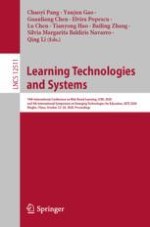2021 | OriginalPaper | Chapter
Is Flexible Learning Flexible for Teachers? An Investigation of the Current Situation of China’s Online Flexible EFL Teaching During the COVID-19 Outbreak
Authors : Min Yuan, Xiaojing Wu, Fengxin Xiong, Wenwen Li, Qiuzhu Xie, Xiaobin Liu
Published in: Learning Technologies and Systems
Publisher: Springer International Publishing
Activate our intelligent search to find suitable subject content or patents.
Select sections of text to find matching patents with Artificial Intelligence. powered by
Select sections of text to find additional relevant content using AI-assisted search. powered by
